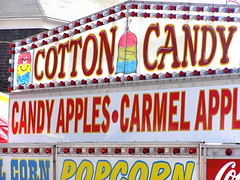Welcome to the 11th Carnival!
David Bigwood of Catalogablog writes about End Users, specifically, the idea of software as end user. Very interesting indeed. Design for harvesting, searching, developing is increasingly
important.
Peachy Limpin of Filipina Teacher-Librarian contributes to the biblioblogosphere conversation on the relationship between libraries and professors. I've heard the same thing from other academic librarians-- if the professors don't take library work seriously and just go through the paces, the students aren't likely to get much out of it.
Joy Weese Moll of Wanderings of a Student Librarian talks about TV as professional development. So true-- if you're in a public library, you need to scan all types of media to be able to do successful readers advisory and answer popular culture questions (why was I the only one to know how to find information on the "frankenfish"?). You also read things that aren't your cup o' tea. I remember back in my public library days waiting with baited breath for each Oprah announcement -- invariably the phones would ring off the hook moments later asking to reserve copies! I think some of the best librarians I know are omnivorous consumers of information. So you go, Joy.
Meredith Farkas of Information Wants To Be Free asks When is a Wiki not a Wiki? She defines wiki and explains why the new WorldCat functionality (allowing users to add reviews, notes, and the table of contents) does not make it a wiki (and also why she is not actually a cat -ed.)
Dave Hook of Industrial Librarian talks about Quantifying a Negative Search. This is great reading. He asks why librarians can't say that they've got xx% of the available information with xx% certainty.
Editor's Picks
Will Richardson over at weblogg-ed has a good post admitting that, yes, Read/Write Web is Work. There are great opportunities, but gone are the days when, as he says, teachers can say "'here's the book, the book is true, we can all passively read now' method of teaching" worked.
I was just commenting the other day how everyone's doing surveys now. Dave Hook of Industrial Librarian has posted his 6 Rules for Survey Requests.
Reaching a little outside of the biblioblogosphere, North Dakota psych professor Mark Grabe points to an article (nb: free reg. req. for page 2) on i-schools related to the recent conference. A quote from the article that indicates why it's included here...
The i-School concept grew from the recognition that the traditional disciplines of information science, computer science, and IT are increasingly overlapping in today's digital, information-age society, said Raymond von Dran, the dean of Syracuse University's School of Information Studies (SIS).
Rather than treat these fields as separate areas of inquiry, a growing number of colleges and universities are combining them into a single discipline. The term "i-School" refers to the program of studies for this newly emerging field, which examines not only how information is created, processed, stored, and retrieved--but also what impact it has on people and society.
There was a kerfuffle on Web4Lib this week about Wikipedia and Authority. Casey at MasionBisson weighs in.
Krafty apparently just singlehandedly brought her library online. Here are some of her lessons learned.
Paul Pival at the The Distant Librarian has some ideas and pointers to tips on how libraries can create and distribute content for the new video iPod.
Wally Grotophorst, a systems librarian from GMU, links to an alternative to Power Point, S5.
Also this week, Marydee Ojala and Richard Akerman both blogged Internet Librarian International.
Meta Carnival
Next week the carnival will be at Frequently Answered Questions . Information on submitting posts is in this post.
Submission Guidelines (which are flexible)
The last five carnivals were:
| September 12, 2005 | ...the thoughts are broken... | Carnival of the Infosciences #6 |
| September 19, 2005 | Mike's Musings | Carnival of the Infosciences #7 |
| September 26, 2005 | The Industrial Librarian | Carnival of the Infosciences #8 |
| October 3, 2005 | ...the thoughts are broken... | Carnival of the Infosciences #9 |
| October 10, 2005 | A Wandering Eyre | Carnival of the Infosciences #10 |





